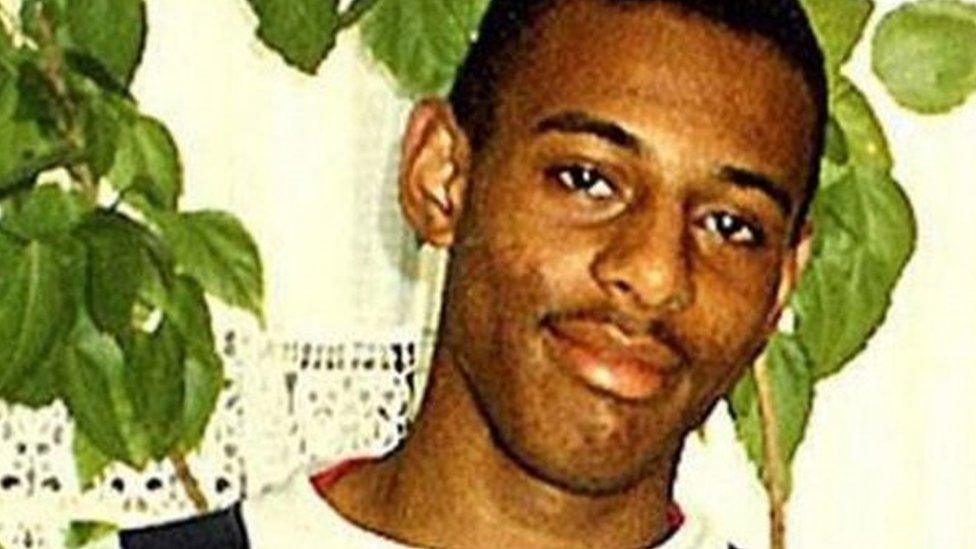London Marathon 2019: Eliud Kipchoge on freedom, simplicity & power of the mind
- Published
- comments

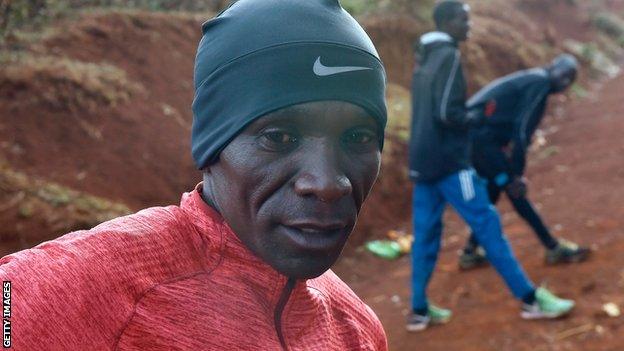
Kipchoge broke the marathon world record in Berlin in September
Eliud Kipchoge's eyes light up. He points to an electric blue band he is wearing on his wrist, where four simple words are written.
"No human is limited."
It could sound like an inane Instagram post from a social media influencer. Coming from the greatest marathon runner of all time it feels anything but.
At the Berlin Marathon last September, Kipchoge set a new world record of two hours, one minute and 39 seconds, an incredible run that took 78 seconds off the previous best. It was the biggest single improvement for over 50 years.
Such a seismic step forward was no surprise. The Kenyan 34-year-old had served notice of his capabilities on 6 May 2017 when he ran 2:00:25 in Monza as part of Nike's Breaking2 project.
Nobody in history has gone closer to breaking the magical two-hour barrier.
That time is not considered a world best because pacemakers who could swap in and out were used, but while the record books have ignored it, the world at large could not possibly turn a blind eye.
Sixty-three years to the day since Roger Bannister's historic four-minute mile, running had been changed forever. The conversation had shifted from 'if' a two-hour marathon was possible to 'when'. For Kipchoge - the once-in-a-lifetime athlete responsible for shifting the sporting axis - the burning question is, how?
His answer lies in the power of the mind.
"The mind is what drives a human being," Kipchoge says. "If you have that belief - pure belief in your heart - that you want to be successful then you can talk to your mind and your mind will control you to be successful.
"My mind is always free. My mind is flexible. That is why I wear this band on my wrist.
"I want to show the world that you can go beyond your thoughts, you can break more than you think you can break."
Success in the world of marathon running is a lucrative business. Having won 10 of the 11 marathons he has entered since switching from track to road running in 2013, Kipchoge is a multi-millionaire.
However, money is not the motivation. Kipchoge believes that "living simply sets you free".
For nearly 300 days a year he lives and trains away from his wife and three children at a simple training centre in Kaptagat, a tiny village in the Kenyan highlands.
He is known as the "boss man" by his training partners but that doesn't stop him cleaning the toilets or doing his share of the daily chores.
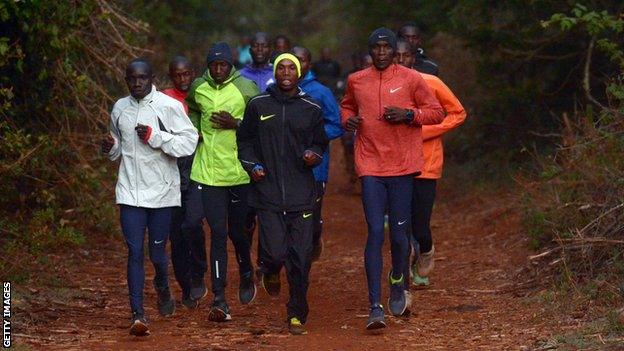
Eliud Kipchoge training in his native Kenya
"I enjoy the simplistic training and life in marathon," he says. "You run, eat, sleep, walk around - that's how life is. You don't get complicated. The moment you get complicated it distracts your mind."
Kipchoge was little more than a kid when he began his journey to becoming the greatest male marathon runner of all time.
At the 2003 World Championships in Paris, aged 18, he won 5,000m gold - a breakthrough victory all the more notable for two additional facts.
Firstly the time - a Championship record of 12:52.79 minutes which still stands today. Secondly the identity of the two men he outkicked in the finishing straight - 1500m world record holder Hicham El Guerrouj and future 5,000m world record holder Kenenisa Bekele.
His track career didn't quite progress as he might have liked from there.
Between 2004 and 2012 he won global medals galore but none of them with gold. Olympic bronze in 2004 was followed by silver in 2008. The only addition to his World Championship collection was a 5,000m silver medal at the 2007 championships in Osaka.
Having failed to even make the Kenyan team for the 2012 Olympics, he switched his focus to the roads. They have since been almost exclusively paved with gold.
Three of those 10 victories so far have come in London and he will start as heavy favourite to become the first man ever to win four on the streets of the English capital this weekend.
A world record is unlikely in London, not least because the course is far less favourable than that of Berlin, where the men's world record has been broken seven times in the past 16 years.
But in the future?
"One day, one time, someone will run under two hours," he says. An inquiry as to whether it could be him brings a laugh. "Maybe. Maybe not."
Brett Kirby certainly still believes.
He worked closely with Kipchoge as the lead physiologist on Nike's Breaking2 project and continues to advise the Kenyan and his coaches in areas such as strategy, workout analysis and race strategy.
"I think it's possible," he says. "I think his race in Berlin [the world record last September] was incredible. And I don't see any decay."
Kirby's belief is based on the many months he spent analysing Kipchoge during that Breaking2 project. Funded by Nike, it was three years in the making but had one simple goal. To produce the first ever sub-two-hour marathon.
The mere mention of the idea was enough to scare off plenty of prospective hopefuls. But not Kipchoge.
"When we started Breaking2 at the time it was very, very scary," Kirby says. "Plenty of athletes were hesitant about doing it.
"For some the approach was either to be egotistical about it and say 'of course I can do it' or to be scared of it and just say 'it's not possible'.
"Eliud respected it, he became a partner in it. He had the discipline and fortitude to take on the challenge. It was amazing to see the respect he gave the idea."
Respect married with the physical and mental capabilities.
"I don't even know how to describe how he has shown me how important the mind is," Kirby said in the Breaking2 documentary released by National Geographic in September 2017.
"I have a big, blank, open box for how I quantify the mind. How do I quantify a person's ability to push beyond what we thought was possible based on physiology alone?"
Eighteen months later Kirby is still working with Kipchoge and is still enjoying trying to work him out.
"On the surface, Eliud might look like just another Kenyan," Kirby says. "But his mind is different, his body is different.
"In layman's terms he has the ability to both run fast and to maintain that speed for a long time. Some people can hold that speed for a half-marathon but being able to do it for a full marathon is what makes Eliud unique.
"Having that sustainable speed - that is the complete package. He always says that 'no human is limited' and he has shown that. In life and in sport. He is impactful as a human being and impactful as an athlete.
"Being disciplined, not just about the two-hour run you are doing but what you're doing the other 22 hours in the day as well. He has definitely changed me and shown and given us so much."
Such discipline is plain to see in Kipchoge's company. The only time the calm demeanour shifts? A question regarding the "failure" of the Breaking2 project.
Kipchoge lurches forward. His eyes wide and his normally soft voice ever so slightly raised.
"Let me tell you one thing," he says. "The Breaking2 project was the most successful project of the 21st century as far as sport is concerned. I have no regrets at all."
A sense of what might have been would be understandable, because time is running out.
Kipchoge is widely regarded to be a few years older than 34. Kenyan runners often don't have birth certificates, having been raised in rural areas, leaving his birthday of 5 November 1984 perhaps uncertain.
And marathon running is a demanding occupation - even for a man like Kipchoge with his "living simply will set you free" ethos.
Paula Radcliffe knows the demands too well. When she set the women's world record of 2:17:18 in Chicago in 2002, the effort required was so extreme that she tore her colon. A year later she lowered that mark to 2:15:25.
Her record still stands today. In fact, Radcliffe remains over a minute and a half faster than her nearest rival, Kenya's Mary Keitany. Her physio Gerard Hartmann described her performances as "going to Mars and beyond". A stratospheric showing that Radcliffe based on some Kipchoge-esque simplicity.
"Some people would look at his life and say that is a sacrifice," Radcliffe says. "I had that singular focus in my career too but I never saw it as a sacrifice. I loved it."
Radcliffe believes Kipchoge still has the capabilities to run under two hours, but has her doubts over whether it will happen.
"If anyone is capable of running sub two hours then he is," she says.
"He is definitely the closest but now, I am not sure. It depends on how many more fast marathons he has in him because everyone has a finite point when you start to slow down. That is different for everyone.
"For me, I ran every single one of my marathons flat out and so it was probably a bit shorter.
"Eliud has not done that in all of his marathons which might help, but it's difficult to say when he might slow down. I don't know how old he genuinely is. At some point he is going to slow down and that is why I am so happy he got the world record in Berlin."
Kipchoge is optimistic on the subject of how long he has left.
"You'll still see me around," he says. "I think there are still beautiful things in store. I am still there to do some cool things."
And when he does say finally say farewell?
"After I retire my plan is to concentrate on inspiring people.
"My dream is to make this world a running world. A running world is a healthy world. A running world is a wealthy world. A running world is a peaceful world. A running world is a joyful world.
"There is freedom in running. Go and run and your mind will be free. That is what is needed in the whole planet."


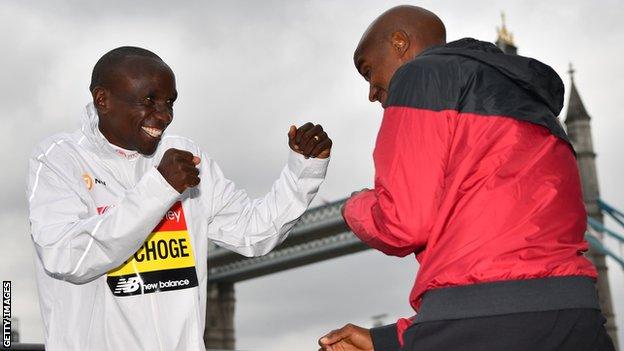
Kipchoge and Mo Farah
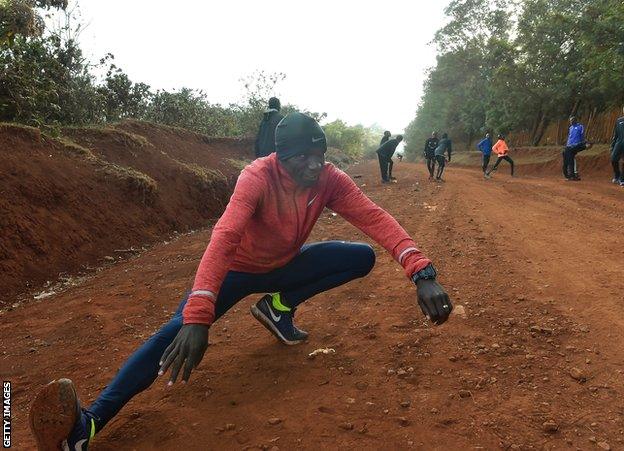
Kipchoge spends the majority of the year training in his native Kenya
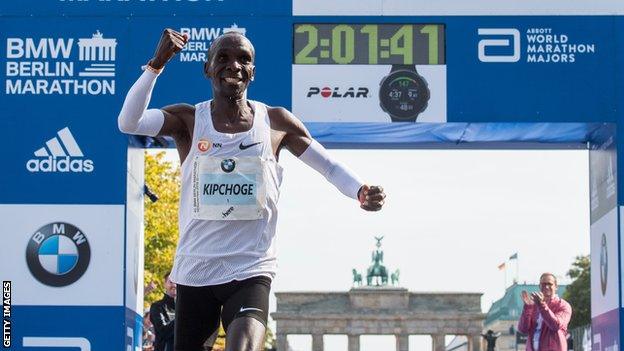
Kipchoge set a world record time of 2:01:39 at the Berlin Marathon in September
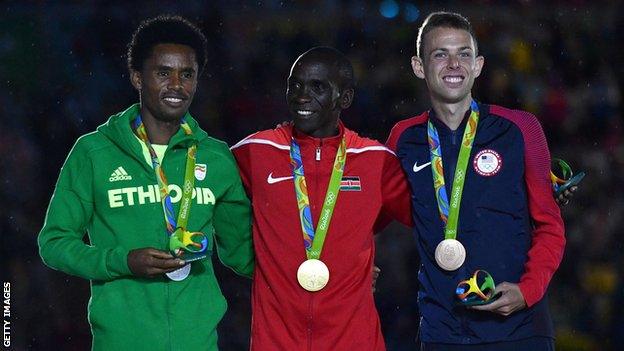
Kipchoge won Olympic gold at the Rio Games of 2016, beating Ethiopa's Feyisa Lilesa (left) and Galen Rupp of the United States (right)
- Published24 April 2019
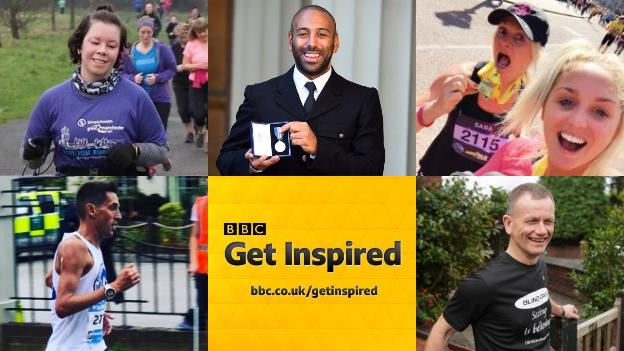
- Published24 April 2019
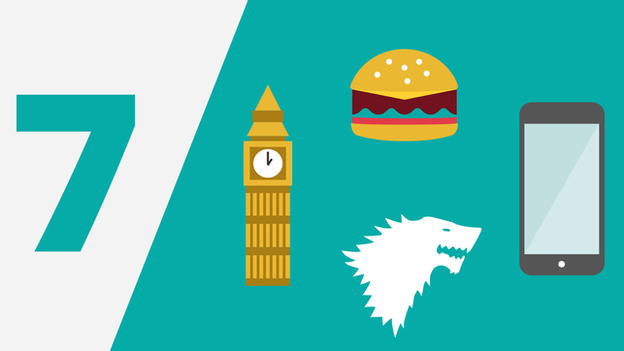
- Published25 April 2019

- Published25 April 2019
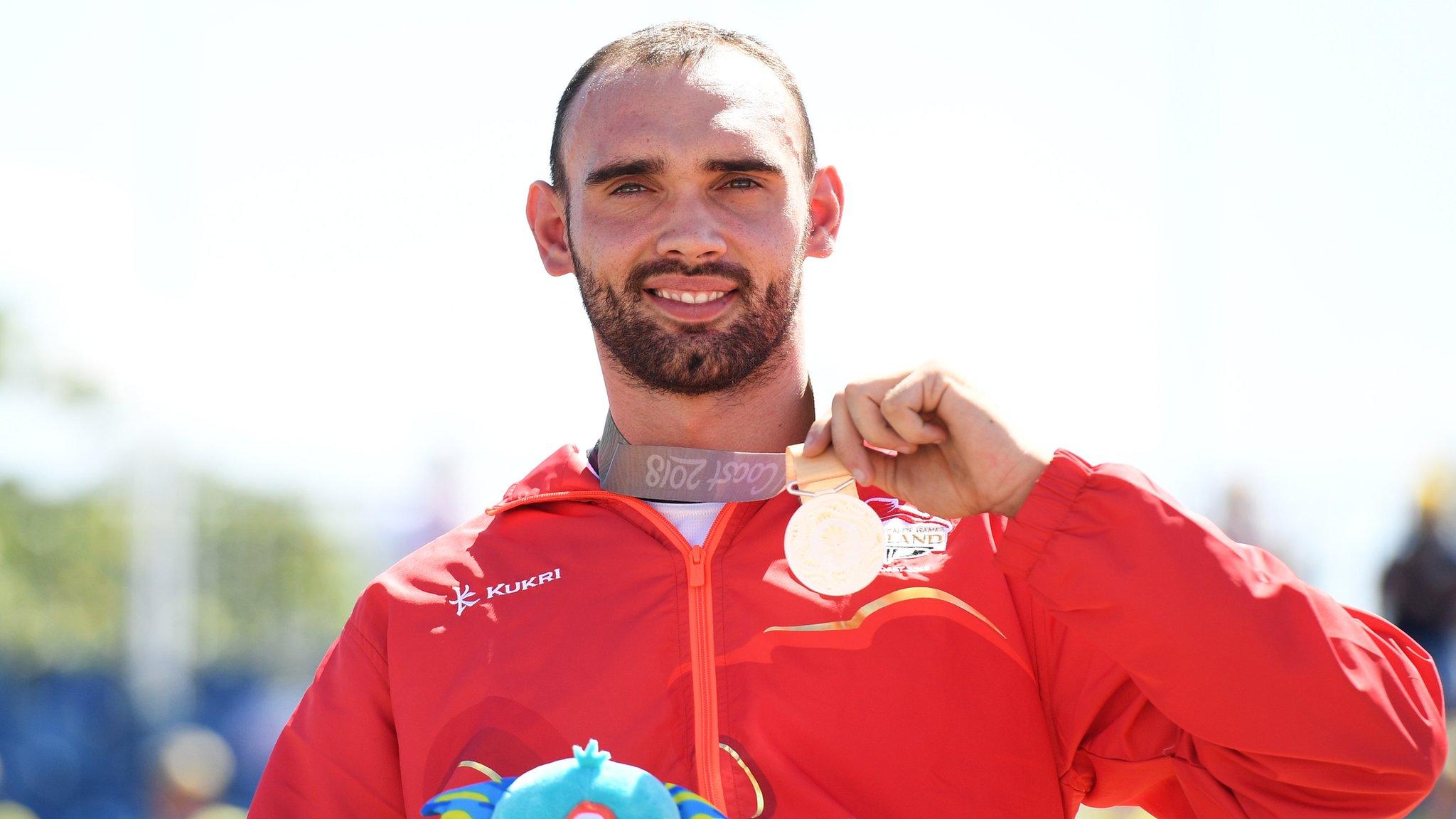
- Attribution
- Published8 February 2019
